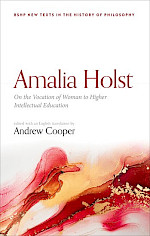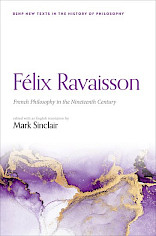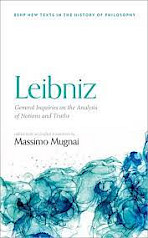
The aim of this book series, sponsored by the BSHP and published by Oxford University Press is to encourage and facilitate the study of all aspects of the history of philosophy, including the rediscovery of neglected elements and the exploration of new approaches to the subject. Texts are selected on the basis of their philosophical and historical significance and with a view to promoting the understanding of currently under-represented authors, philosophical traditions, and historical periods. They include new editions and translations of important yet less well-known works which are not widely available to an Anglophone readership. The series is managed by an editorial team elected by the Society. It reflects the Society’s main mission and its strong commitment to broadening the canon.
Editors:



Amalia Holst: On the Vocation of Woman to Higher Intellectual Education, edited, translated and introduced by Andrew Cooper. Oxford: Oxford University Press, 2023, 224 Pages. ISBN: 9780192845948. View on OUP website
This edition offers the first English translation of Amalia Holst's daring book, On the Vocation of Woman to Higher Intellectual Education (1802). In one of the first works of German philosophy published under a woman's name, Holst presents a manifesto for women's education that centres on a basic provocation: as far as the mind is concerned, women are equal partakers in the project of Enlightenment and should thus have unfettered access to the sciences in general and to philosophy in particular.
Holst's manifesto resonates with the work of several women writers across Europe, including Olympe de Gouges, Mary Wollstonecraft, and Germaine de Staël. Yet in contrast to the early works of feminism we celebrate today, her book had little success. Its reception confronts us with a darker side of the German Enlightenment that, until recently, has been neglected. Holst sought to unearth the gendered nature of the fundamental concepts of the Enlightenment—including vocation, education, and culture—which enabled men to establish the subordinate status of women by philosophical means. However, her argument was scorned by male reviewers, who denied the very possibility of a woman philosopher.
With an introduction by Andrew Cooper, and translations of biographical material and early reviews, this edition provides students and scholars of German philosophy with a timely resource for developing a richer understanding of their field, and general readers with a powerful early feminist text that reveals the opportunities and difficulties facing women philosophers at the turn of the nineteenth century.
Félix Ravaisson, Nineteenth-Century French Philosophy, edited, translated, and introduced by Mark Sinclair. Oxford: Oxford University Press, 2022, 224 Pages. ISBN: 9780192898845. View on OUP website
Félix Ravaisson's French Philosophy in the Nineteenth Century is one of the most influential and pivotal texts of modern French thought. Commissioned by the Minister of Public Instruction as one of a series of reports to record the progress of the French sciences and humanities for Paris' second world fair, the 1867 Exposition universelle d'arts et d'industrie, it was published with the others the following year. In the report Ravaisson argues, with verve and generosity, and with an unparalleled command of the century's intellectual developments, that the myriad voices in nineteenth-century French thinking were beginning to form a chorus, one that was advancing towards a new, more concrete form of spiritualist philosophy able to resist materialist, mechanist and sensualist doctrines while incorporating recent developments in the life-sciences. As Henri Bergson noted, it effected a "profound change of orientation in university philosophy" and for decades afterwards students learnt its concluding sections by heart in order to pass public examinations. Bergson's own Creative Evolution, which made him the world's most celebrated living philosopher at the end of the long nineteenth century, is, with its psychological interpretation of biological evolution, a direct expression of the new philosophical orientation that Ravaisson had divined in the report.
Gottfried Wilhelm Leibniz, General Inquiries on the Analysis of Notions and Truths, edited, translated and introduced by Massimo Mugnai. Oxford: Oxford University Press, 2020, 176 Pages. ISBN: 9780192895905. View on OUP website
In General Inquiries on the Analysis of Notions and Truths, Leibniz articulates for the first time his favourite solution to the problem of contingency and displays the main features of his logical calculus. Leibniz composed the work in 1686, the same year in which he began to correspond with Arnauld and wrote the Discourse on Metaphysics. General Inquiries supplements these contemporary entries in Leibniz's philosophical oeuvre and demonstrates the intimate connection that links Leibniz's philosophy with the attempt to create a new kind of logic.
This edition presents the text and translation of the General Inquiries along with an introduction and commentary. Given the composite structure of the text, where logic and metaphysics strongly intertwine, Mugnai's introduction falls into two sections, respectively dedicated to logic and metaphysics. The first section ('Logic') begins with a preliminary account of Leibniz's project for a universal characteristic and focuses on the relationships between rational grammar and logic, and discusses the general structure and the main ingredients of Leibniz's logical calculus. The second section ('Metaphysics') is centred on the problem of contingency, which occupied Leibniz until the end of his life. Mugnai provides an account of the problem, and details Leibniz's proposed solution, based on the concept of infinite analysis.
